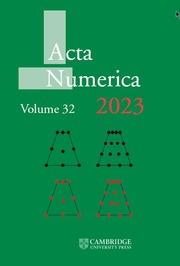No CrossRef data available.
Article contents
Optimization problems governed by systems of PDEs with uncertainties
Published online by Cambridge University Press: 01 July 2025
Abstract
This paper reviews current theoretical and numerical approaches to optimization problems governed by partial differential equations (PDEs) that depend on random variables or random fields. Such problems arise in many engineering, science, economics and societal decision-making tasks. This paper focuses on problems in which the governing PDEs are parametrized by the random variables/fields, and the decisions are made at the beginning and are not revised once uncertainty is revealed. Examples of such problems are presented to motivate the topic of this paper, and to illustrate the impact of different ways to model uncertainty in the formulations of the optimization problem and their impact on the solution. A linear–quadratic elliptic optimal control problem is used to provide a detailed discussion of the set-up for the risk-neutral optimization problem formulation, study the existence and characterization of its solution, and survey numerical methods for computing it. Different ways to model uncertainty in the PDE-constrained optimization problem are surveyed in an abstract setting, including risk measures, distributionally robust optimization formulations, probabilistic functions and chance constraints, and stochastic orders. Furthermore, approximation-based optimization approaches and stochastic methods for the solution of the large-scale PDE-constrained optimization problems under uncertainty are described. Some possible future research directions are outlined.
Information
- Type
- Research Article
- Information
- Creative Commons
- This is an Open Access article, distributed under the terms of the Creative Commons Attribution licence (http://creativecommons.org/licenses/by/4.0/), which permits unrestricted re-use, distribution, and reproduction in any medium, provided the original work is properly cited.
- Copyright
- © The Author(s), 2025. Published by Cambridge University Press

